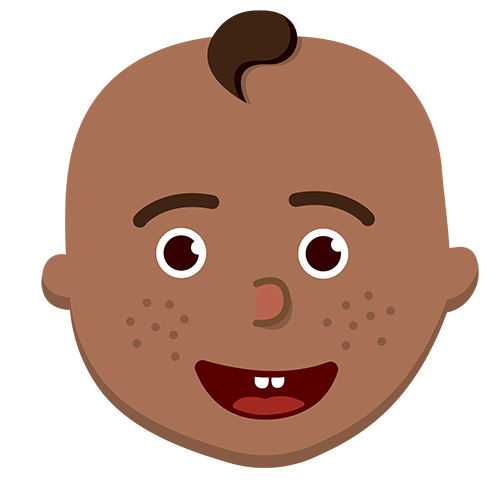
Baby (primary) teeth are key to a healthy mouth and are critical to the growth of the child. Baby teeth start to erupt (come in) when the baby is around 6 months old. They will have a full set of 20 baby teeth by age 2.
Purposes of baby teeth:
- Help jaw growth.
- Hold space for permanent teeth.
- Help speech development.
- Makes it easier for a child to eat more nutritious foods.
In addition, baby teeth give children their first experiences caring for their oral health (brushing, flossing and visiting the dentist).
There are a few ways that baby teeth differ from permanent teeth. The tooth enamel (hard outside shell of the tooth) is thinner on baby teeth which makes them more prone to cavities. Due to the thinner enamel, once a cavity develops on a baby tooth, it progresses quickly to the nerve inside. This makes treating cavities in children very painful. Experiencing dental pain may result in a child being terrified of going to the dentist, a condition called dental phobia or anxiety.
If a baby tooth has to be removed prematurely by a dentist, it may affect the way the permanent tooth comes in by either delaying it or causing it to come in crooked. As the child gets older, more serious orthodontic work may be required. These issues may result in costly dental treatment.
What happens when a baby tooth develops a cavity?
Cavities in baby teeth can have both short- and long-term impacts on a child.
| Short-term effects | Long-term effects |
|---|---|
| Pain | Oral health issues into adulthood |
| Infection | Higher risk of cavities on permanent teeth |
| Appetite issues | Impacts to the child's height and weight |
| Trouble sleeping | Costly and time-consuming treatments |
| Absences from school | Harm to speech, nutrition and self-esteem affecting a child's overall quality of life |
| Trouble concentrating | |
| Emergency medical or dental treatments | |
| Tooth loss |
How can parents and caregivers prevent Early Childhood Caries (cavities)?
Parents and caregivers can be the first line of defense when it comes to protecting children from cavities.
Some tips for prevention include:
- Limiting your child’s bottle to mealtimes so that they are not drinking from it all day and teaching them to drink from a cup as early as possible.
- Cleaning your child’s mouth even before teeth erupt with a soft toothbrush or a wet cloth.
- Never dipping pacifiers in any sweet liquids, sugar or honey.
- Providing healthy snack and drink options for your child.
- Scheduling a dentist appointment for your child by their first birthday.

You can also conduct an oral exam on your child at home to detect early signs of cavities and other oral health issues. To do this, look in your child’s mouth for any white spots near the gum line (particularly on the front teeth), brown spots, holes or broken teeth. These are all signs of Early Childhood Caries.
Tooth decay is the single most common chronic childhood disease. To keep a child’s baby teeth healthy, the best approach is combining good homecare habits like diet and oral hygiene; professional care like preventive treatments and routine cleanings; and early education about oral health and water fluoridation. By using all of these important tools, children can have a happy AND healthy smile!
This information in this post is for general educational purposes only and does not warrant or represent any information as related to health as specifically appropriate for you. It is not intended to be medical advice or replace the relationship that you have with your health care providers. You should always seek medical advice on any diagnosis or treatment from a qualified health care provider. The information is provided “as is” without any representations or warranties, express or implied.
Subscribe now
Your address and personal information will be safely stored in our database. We do not share or sell this information with anyone. You can unsubscribe to this subscription at any time.






